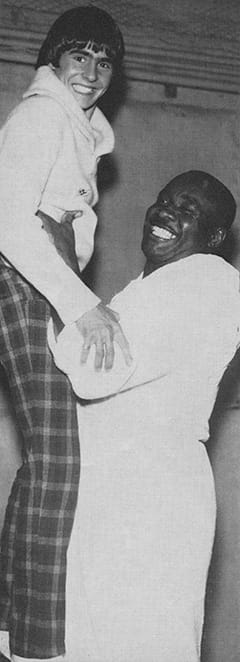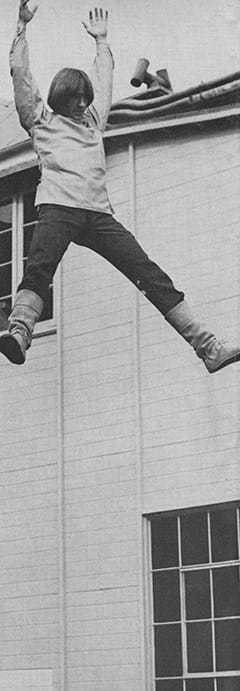
Info [Above & next]: Two Monkees caught in mid-air. Davy in the muscular arms of ex-Heavyweight World Champ, Sonny Liston, and Peter Tork just about to plummet earthwards. 
Info [Above & next]: Two Monkees caught in mid-air. Davy in the muscular arms of ex-Heavyweight World Champ, Sonny Liston, and Peter Tork just about to plummet earthwards.
Taken all round, Davy Jones got on well with America right from the start—and vice versa. “I guess I was a bit naive,” admits Davy now… “I thought the place would be full of gangsters, like in the old films they showed on telly at home.
“At first, lots of people stared at me when I walked down the street. I couldn’t understand it. I wore American clothes and I didn’t have much to say for myself, so it obviously wasn’t because they knew I was an English lad. I began to get that stared-at feeling, specially in New York.
“Then I realised. I had long hair, which suited my part in ‘Oliver’, but most of the Americans were still on a short crew-cut style. Later on, of course, long hair became accepted in the States, specially on the pop music scene.
“But the people were very friendly. I stayed in theatrical digs most of the time and got to know a lot of actors. A few actresses, too, I’m pleased to say. We had nearly three years with ‘Oliver’ and I guess I was happy all the way through that run. But I also get itchy feet after being too long in one place. By the time it had finished, I felt half-American in my outlook.
Of course, Davy also went into “Pickwick” in Los Angeles, over on the opposite coast to New York. And, with his pleasant and bubbling personality, he was a popular figure. He had the part of a glue-sniffer, believe it or not, in a “Ben Casey” telly production, played a Congressman’s son who formed a rock group in the “Farmer’s Daughter Show” series, and also made an LP for Colpix, now Colgems. But, over that particular production Davy prefers to keep quiet.
Well known Permalink
And then came the Monkees. Davy was a natural for his particular part in the series and he was already so well known to the Screen Gems-Columbia folk that he didn’t really have to worry about the formality of an audition.
But though he was a natural, he recalls: “I’d been away for a long time from home. I still had this hankering for becoming a jockey. What I really needed was some sort of chat with my dad and my friends back home I felt they’d be able to advise me just what to do. But even so, I said ‘yes’ and so it was on—I was gonna be a Monkee. I still got back home, though, and spent a few weeks with the folks. Mind you, I had to keep pretty quiet about the Monkee plans, because the whole series was on the secret list—we didn’t want anybody else coming in to steal the idea of a rock group getting into all sorts of zany situations.”
During that month or so back home, Davy got back into the horsey atmosphere and often found himself wondering whether the tinselly life of show business was really for him. “I’d have loved for the Monkees to be made in Britain”, he said. “That would have clinched it in every way.
Amazed Permalink
“But I thought back to those early days in America—how amazed I’d been at the size of the U.S. department stores and how the lights on Broadway had been so impressive. And those steaks. Did you know that I never ever had steak while I was in England? That’s true, you know! I remember that for the first month or so in America, I ordered it for every meal, even breakfast. But as time went by, I got used to the pace and the style of America—as I say I felt I was really part of the scene. I kinda belonged. Know what I mean?”
Sure, we know what Davy means. And in passing it’s worth noting that it must have taken a lot of courage for a young lad to have made a whole new life for himself in America. We’re glad he had that sheer nerve—otherwise he’d have been lost to the whole Monkee scene.
Now, so far in our story we’ve got Micky up to the audition point… and Davy has now followed. With apologies once again for having to switch round our themes, we return to Mike Nesmith, who you’ll remember had to do his stint in the U.S. Air Force: wasn’t particularly keen on it but did it with a smile and also kept his hand in at entertaining his fellow servicemen.
Mike, remember, was already married. Happy as a man can be with his wife, he nevertheless worried a lot about whether he’d ever make the grade in show business. But he figured that Los Angeles was the place where all the action was, so he and Phyllis made a home there and, whenever he could find work, he’d turn up at clubs like Ledbetter’s and the Troubadour… names of places that often seem to crop up in the Monkees’ Story.
Let Mike talk about those days, in his own words. “The guys I met round those clubs and eating-houses were essentially my kind of guys. By which I mean they all felt they had something to contribute and they didn’t act like normal show-business people, who, let’s be honest, turn on a lovey-dovey personality even when they hate the guts of the other people around.
“There were a lot of us singers, trying to build a reputation, and we found we could all be honest with each other. I’ve long time believed that if you feel you must speak out on some controversy, well… go right ahead just as long as you’re being honest about it. It’s kinda like getting to the heart of things, not pulling punches just to give the nice-guy bit.
Entertaining Permalink
“None of us had much money but we did have freedom. And that’s important. Nobody paid us vast sums of money to do our entertaining, so we felt we were entitled to do what WE wanted rather than what we were directed to do.
Mike as a performer was, in those days, roughly in the same category as was Peter Tork. Mostly he sang folk material—traditional airs, but given his own individual treatment. He accompanied himself on guitar. But he also found that some of his dry-as-dust little “funnies” between songs got audiences laughing. The more they laughed, the more his face would stay with a dead-pan expression spread all over it.
“I guess most Texans are like that”, he said. “We look at things around us, things that are happening, and we make our own statements about them. Comes out kinda sarcastic, but we’re built like that.”
And, of course, that is the basis of Mike’s performances with the Monkees. A dead-pan delivery of off-beat statements… and it’s interesting to see how close this is to his real-life image and personality.
Folks in America have long idolised a comedian named Will Rogers, one of the great folk comics of all time. And nothing has amazed Mike more than the critics who have said that he is in the same class as the legendary Will.
As Mike says now: “People don’t think I am as ambitious as I really am, deep down inside. Those days in LA, before the Monkees, I used to give the impression that if there was some work to do… okay, I’d do it. Otherwise, why bother. But I did care, no doubt about it. When you’re trying to look after a lovely wife and you’re not sure where the money’s coming from, you DO worry. Phyllis was great right through these days. Sure we had the occasional spat, but she never made me feel inadequate, even when I was barely earning enough to buy a cheap cut of meat.
“That, too, is how I came to be a pretty useful handyman around the home, which then was a tiny apartment. I couldn’t afford to send out for an electrician, or a carpenter, or a cleaner, so I learned to do it for myself. Same with an old car I managed to get—I had to learn how to do the repairs, ’cos food is more important than paying someone to tinker with the engine of a clapped-out old banger.”
But Mike, professionally speaking, felt he was destined to remain one of nature’s drifters. Until, that is, some university students, fans of his singing, told him about… a certain audition! What happened leading up to that historic event will have to be held over to next month’s ‘Monkees’ Monthly’. But it’s sure a pretty startling story!


